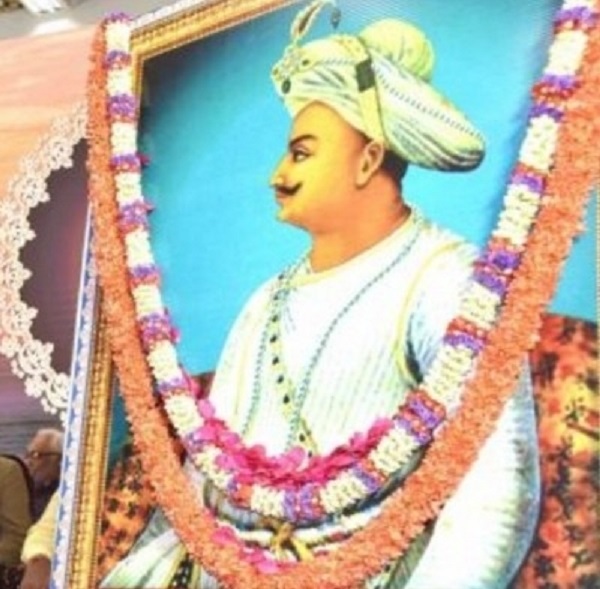Bengaluru, (Asian independent) It is common in every household of south Karnataka to address their kids as Tipu Sultan till date. In Mysuru, the historical and cultural capital of Karnataka, Tipu Sultan is known to be a valiant king who faced the British with all his might.
Even though people from the Kodagu region had reservations over the massacre of Kodava community members by Tipu Sultan, the bitterness never spilled over to the streets. The situation is however, different today.
Unlike contemporary rulers, Tipu Sultan used modern weapons such as Mysorean rockets to pound the British army. The rocket technology was the basic inspiration for the discovery of the Bangalore Torpedo, which was used extensively in World War I and II.
Tipu Sultan also tried to forge an anti-British alliance with Napoleon Bonaparte. Historical evidence has etched a special place for Tipu Sultan in the history of the country’s struggle for freedom against the British.
Matters took a political turn with the Congress government headed by Siddaramaiah deciding to celebrate Tipu Sultan’s birth anniversary. The BJP, then in the opposition, had rallied against the decision and challenged the Congress that it will not allow the celebrations to take place.
The Tipu Jayanti, however, was celebrated with fervour across Karnataka. In Kodagu, it led to widespread violence and death of a BJP worker. The bitter debate started over Tipu Sultan as a tyrant, a religious fanatic who tried to convert all Hindus to Islam.
BJP leaders quoted the letters said to be written by Tipu Sultan describing how he captured and converted Hindus to Islam in the Malabar region of Kerala. Congress and progressive leaders gave examples of how Tipu Sultan contributed to temples and saved Sringeri Mutt from the onslaught of Marathas.
They even argued that the temple of Ranganatha Swamy, located close to the palace of Tipu Sultan, managed to survive. However, the BJP government came to power in 2019, then Chief Minister B.S. Yediyurappa declared that Tipu Jayanti would not be celebrated.
Pratap Simha, BJP Lok Sabha MP from Mysore-Kodagu, maintains Tipu Sultan is wrongly interpreted as the Tiger of Mysuru. “He never fought a war and died inside the fort. Tipu Sultan was indulged in religious conversion and treated Hindus with brutality.”
He further states that Tipu Sultan is unnecessarily glorified by the so-called progressive writers and politicians as part of appeasement politics.
Minister for Education B.C. Nagesh has maintained that though the reference to Tipu Sultan as the ‘Tiger of Mysore’ is being taken off, the content on Tipu Sultan will continue to remain in school syllabus.
Nazia Kousar, author of yet-to-be-published ‘Bharatada Huli Tipu Sultan’ (Tiger of India Tipu Sultan) stated that Tipu Sultan’s tolerance is reflected in his annual grants to no less than 156 temples, which included land deeds and jewellery.
“His army was largely composed of Shudras. When the famed Sringeri Mutt, established by Shankaracharya, was invaded by the Maratha army, he issued a firman to provide financial assistance for reinstallation of the holy idol and restoring the tradition of worship at the Mutt,” she explained.
His donation to the famous Srikanteshwara temple at Nanjangud; the donation of 10,000 gold coins to complete temple work at Kanchi; settling the disputes between two sects of priests at the Melkote temple; and gifts to Lakshmikanta temple at Kalale are all well-known.
Interestingly, Srirangapatna, a temple town, remained his permanent capital till the end of his rule. He was also instrumental in constructing the first-ever church in Mysuru. Incidentally, well-known historian B.A. Saletore calls him “defender of Hindu Dharma”, Nazia Kousar explains.
The allegation of forcible conversions has to be seen in the background of political exigencies — either they were with the colonialists such as in the case of Christians of Dakshina Kannada, or were waging a protracted guerrilla war as in the case of Coorg.
Here, historians have distorted the facts by reducing political exigencies to the “communal ideology” of Tipu, she says.
After Ganesh festival, which is likely to create a crisis situation in the state in the backdrop of the row over Veer Savarkar, organisations are gearing up to celebrate Tipu Jayanti on November 20, challenging the ruling BJP government.








